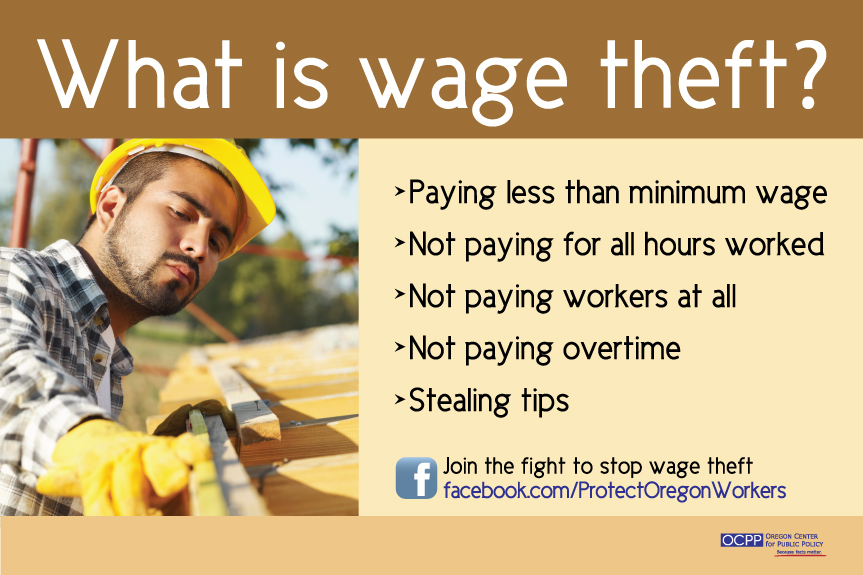First Reading of Proposed Wage Theft Bylaws On Council Agenda for October 19

Photo: Oregon Center For Public Policy
Amherst’s proposed Wage Theft Bylaws will be brought before Town Council for a first reading on Monday, October 19 and for a second reading and vote on Monday, November 9. The bylaws were drafted and sponsored by Councilors Pat DeAngelis (Precinct 2) and Mandi Jo Hanneke (At large).
Background
According to the Western Massachusetts Area Labor Federation, wage theft is a growing crisis across the country and state. In Massachusetts alone, an estimated $700 million is stolen from workers every year. It affects many industries but is particularly problematic in the construction and service industries.
Wage theft can take many different forms, including workers who are misclassified as independent contractors, paid cash wages, paid in lump sums for a week’s work regardless of the hours worked, not paid overtime, not paid in full for the hours they’ve worked, and sometimes not paid at all.
Companies and contractors that “play by the rules” (pay employees properly, pay taxes, and provide workers’ compensation) should not have to compete against companies that are known to have violated wage and hour rules. The proposed Amherst bylaws are based on successful municipal wage theft ordinances now in place in Northampton, Easthampton, Springfield, and other cities across the Commonwealth and the country.
The COVID-19 pandemic is exposing the different dangers many low-wage jobs pose for workers, and the fragile economic positions of many workers. As less work is available and an increasing number of workers grow more desperate for paychecks, it is even more important to shine a light on the problem of wage theft and to work to deter it from happening.
The Amherst Bylaws
According to DeAngelis, there are two proposed Amherst bylaws, and they would accomplish the following:
The Responsible Employers Contracting and Tax Relief Agreements Bylaw requires contractors seeking public funds for construction or financial awards — such as tax incentives to private developers — to certify they have not been cited for wage theft violations in the past five years. Those with a recent history of violations would be barred from construction and tax incentive contract awards. Those who do get a contract award would have to comply with the wage theft laws or be in breach of their contract and subject to penalties, including termination of the contract, fines, or the return of tax relief they have received. This bylaw also sets targets for workforce diversity for construction and tax incentive contract awards.
The goal of the Wage and Tip Theft Bylaw is to promote wage justice by increasing employees’ knowledge of their rights and providing a path to report complaints locally because going directly to the Attorney General’s office can be intimidating for workers. Importantly, this bylaw prohibits (and imposes fines) retaliation against workers who try to exercise their protected rights. It also authorizes the Board of License Commissioners to require wage bonds for prospective licensees who have incurred wage law violations in the past three years; if further violations occur, licenses can be revoked or corrective wage bonds for wage or tip violations can be required. The focus of the bylaw is on the hospitality and service sector.
Enforcement
The Town’s Human Resources Director will be the contact for complaints, and will inform the worker how and where to file a complaint with the Attorney General’s office. That office will determine whether a violation has occurred. The Human Resources Director will also alert the Procurement Department or the Board of License Commissioners, if the Attorney General finds a violation. Working with the Town’s Human Rights Commission, the Council and Town Manager will also receive an annual report detailing complaints, actions taken by the Town, and any civil or criminal judgments issued by state or federal courts, or by administrative citations, so that they are aware of the extent of the problem here. We are fortunate in Massachusetts to have an Attorney General’s office that produces Workers’ Rights posters in seven languages (Poster) and is willing to local conduct clinics to raise awareness and provide legal advice. (Clinic) The Town will distribute a simple poster and FAQ with information on filing complaints.
The most recent drafts of the bylaw can be found here: the Wage and Tip Theft Bylaw and the Responsible Employer and Tax Relief Agreement Bylaw. A summary of the proposed legislation with additional background information provided by the Western Massachusetts Area Labor Federation can be read here.
Council’s First Reading
The bylaws will receive a first reading at the regular Town Council meeting on October 19 beginning at 6:30 p.m. This meeting will be held as a Zoom webinar and there will be a public comment period, although Amherst residents who wish to share a position on the bylaws are advised to contact their Council representatives in advance of the meeting. People can attend the meeting on Zoom at https://amherstma.zoom.us/j/94944374648 or by phone at 312 626 6799. The meeting will also be simulcast on Amherst Media Channel 17.
Previous Reporting
Previous Indy reporting on the proposed Wage Theft bylaws can be found here, here, here, here, and here.

There are three sponsors for the Wage Theft Bylaws, myself, Mandi Jo, and Cathy Scheon. We have been working collaboratively on these bylaws for over a year now. Pat